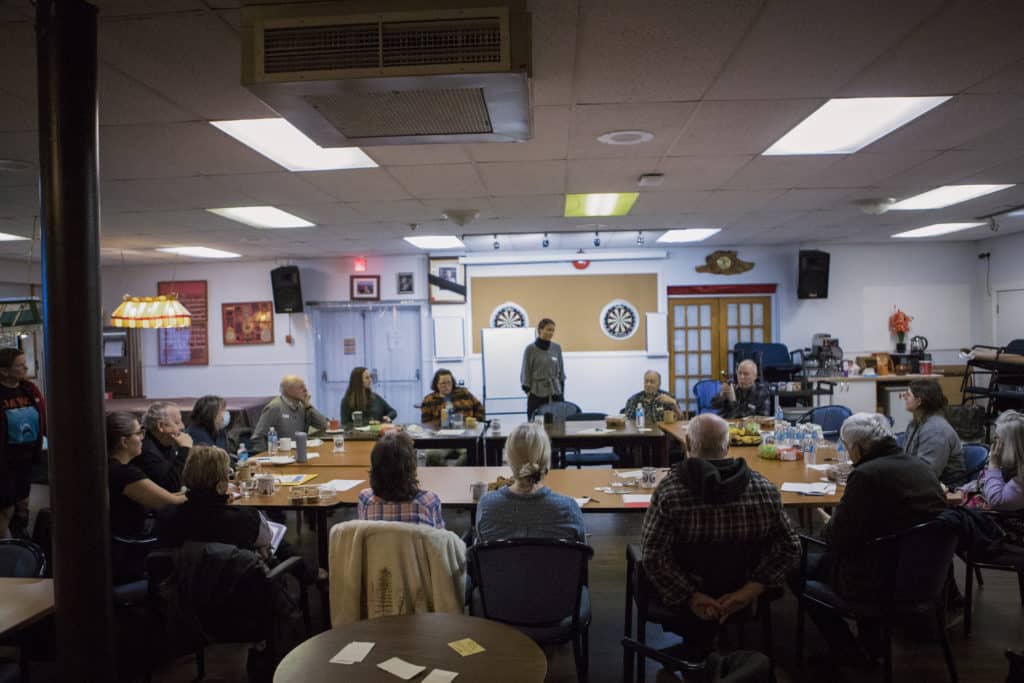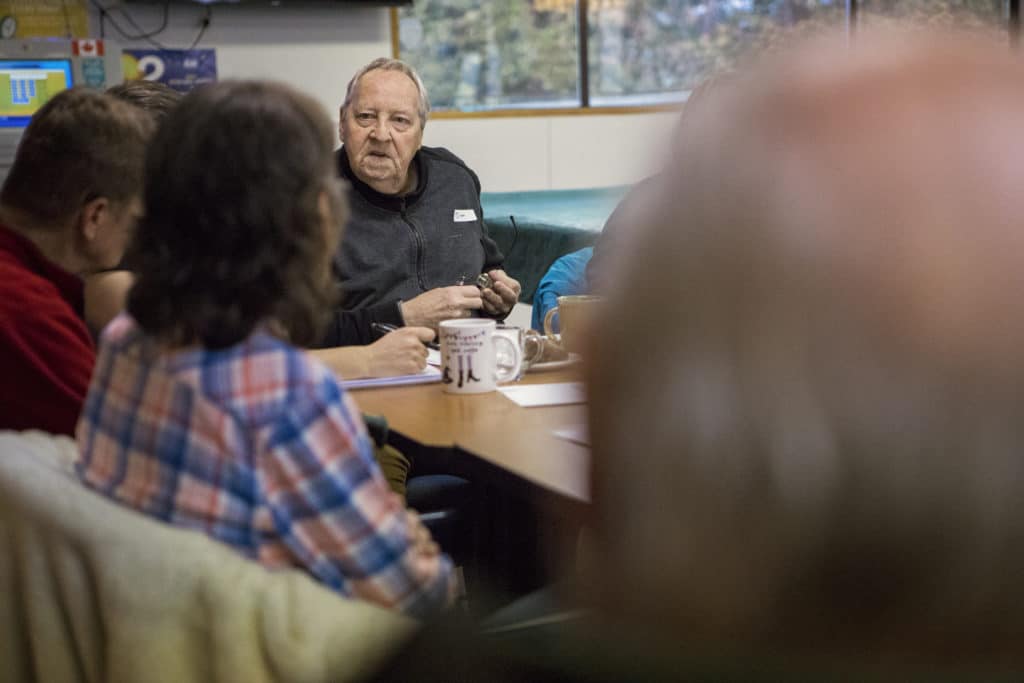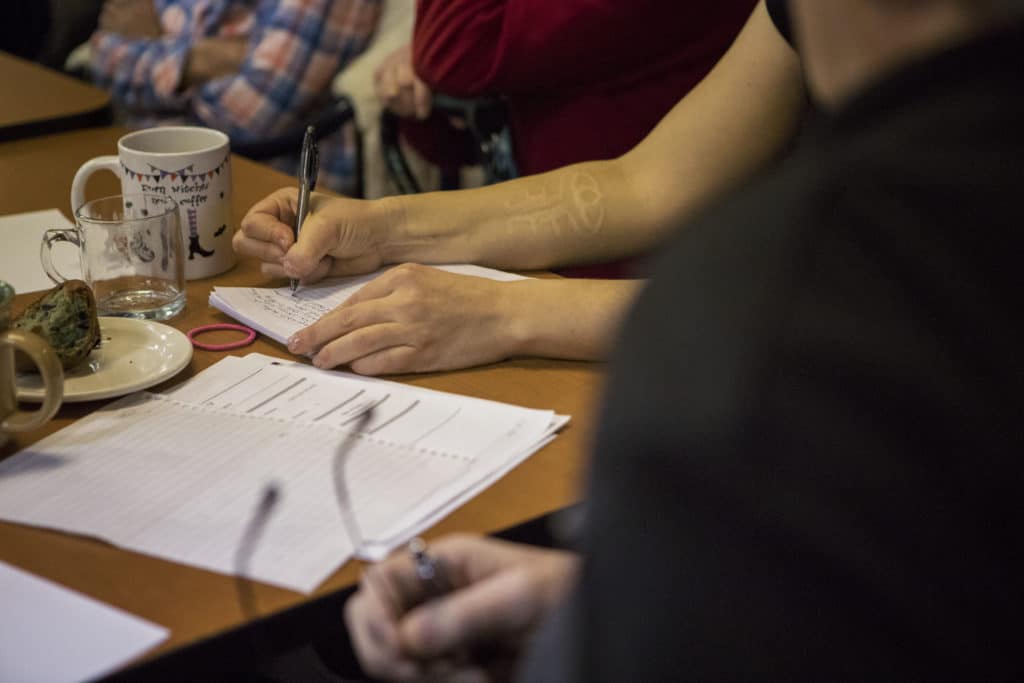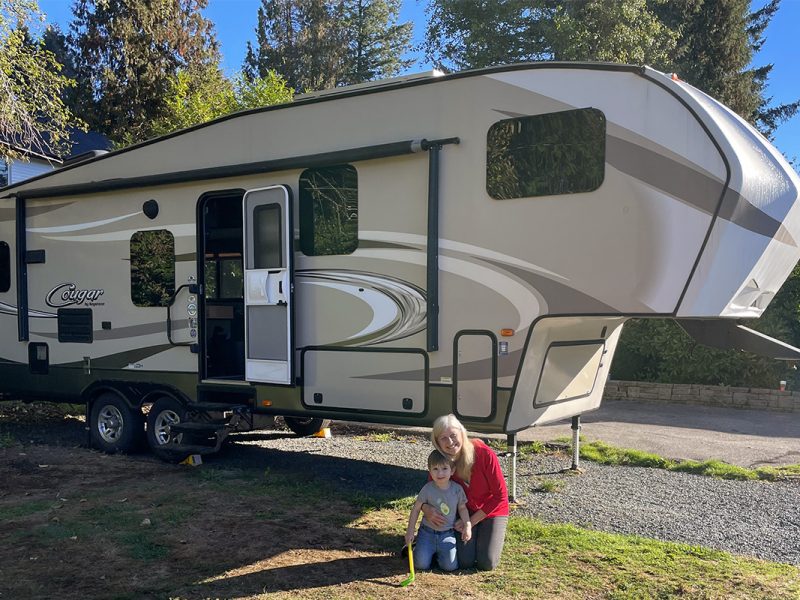
Last week The Discourse Nanaimo held its first in-person story circle to close out the investigative series, It Takes a Village.
Part of the reason I decided to join The Discourse as a reporter is that their commitment to in-depth, community-driven reporting really resonated with me, as did the 10 principles the organization is run by.
The way we do journalism means a focus on solutions — we don’t just report on the problems that exist in our communities, but also seek to actively investigate the solutions to these issues.
As my editor Lauren Kaljur explained early on when I joined the organization, part of solutions journalism means engaging with the community. Last Thursday, that took the form of hosting a story circle — kind of like a town hall meeting — where people came together to share lived experiences and ideas.
COVID-19 restrictions made these kinds of in-person gatherings tricky, so this was the first story circle I’ve hosted, along with Lauren and community reporter and photographer Rae-Anne Guenther, focused on low-income and older renters in our community.
About 18 of us gathered around a set of tables at the Mount Benson branch legion, a space generously donated for this community event.
Some attendees car pooled to get there in the pouring rain. A few people attended as observers, including two city councillors, Hilary Eastmure and Erin Hemmens, along with Sacia Burton, a representative from the BC Poverty Reduction Coalition.
Here are some of the solutions that were surfaced by those present:

Localized support could help renters navigate a complex system
While some renters said they were encouraged to address issues directly with their landlord, some said this was either unsafe or impossible. When faced with eviction or other challenges within their rental complexes, tenants said third-party support is essential.
This bears out in some of what I observed in researching the series. In several cases, tenants were evicted or almost evicted because they lacked education on how to properly respond to eviction notices or advocates who could guide them. This environment, coupled with soaring rent prices and low vacancy rates, makes renters vulnerable to exploitation.
Renters in Nanaimo and the wider Vancouver Island-based community need some kind of advocacy that is based on the Island, similar to the Tenants Resource and Advisory Centre in Vancouver.
These advocates could provide legal advice, offer a central place for tenants to access and understand what resources are available to them, and perhaps function as intermediaries between tenants and landlords, or tenants and the Residential Tenancy Branch.
Tenants with vulnerabilities due to income, age or disabilities have specific needs to consider
Landlords or organizations like Nanaimo Affordable Housing Society that offer rentals to older tenants or those with disabilities maintain their units are for “independent living.”
However, older tenants will, at some point or another, need support. Age-related diseases like dementia progress gradually. Without support like on-site building staff to help respond to emergencies, access to cleaning services and accessibility adaptations like place to park scooters, people are slipping through the cracks. Unforseen extreme events like pandemics, heat domes and heavy snowfall only exacerbate these situations.
With community input and involvement at planning stages, these oversights could be fixed. Some wondered whether there were any local organizations that could step in to provide support services to fill the gaps.

Low income, older and disabled tenants want to be treated with respect and dignity
Many people in the circle spoke of their frustration at being treated like a child or as a “burden” on society because of their unique needs, even though their present situation may follow on from many years or even decades of being productive, contributing members of the community.
A new approach grounded in respect is needed, especially in dealing with tenants who are low-income, older or with disabilities. This is needed throughout the community, from the grocery store line up to the parking lot. The issue of being disrespected or treated unfairly seems especially upsetting and even traumatic for older tenants, to a degree that is worth noting.
Tenants spoke to safety issues associated with the elimination of designated smoking areas as a result of new rules implemented by their housing provider. A harm reduction approach must be extended to older people who use tobacco, tenants said.
Fostering community within low-income rental complexes keeps residents safe
Many attendees spoke to the need for a return to a tenant-centered approach to housing, rather than a profit-driven one, that prioritizes care for tenants, and encourages a sense of community in their housing complexes.
When tenants’ collective needs are supported, through an on-site caretaker, access to resources like a shared amenity space or a tenant contact sheet to facilitate wellness checks, residents can keep an eye out for one another
A mix of backgrounds and ages within rental complexes could benefit everyone
Several participants at the story circle said they thought a focus on having mixed-age tenants might work well in housing complexes, if it was overseen responsibly and with intention. “I would love to see some young kids around,” one attendee said.
A diverse mix of nonprofit housing providers could prevent a power imbalance
One idea that was discussed was whether it might be better to return to having a variety of different affordable housing providers. For example, Gen. George R Pearkes, Lion’s Club, Mount Benson Seniors Society used to operate in Nanaimo independently, before they were acquired by Nanaimo Affordable Housing Society. Some suggested this could protect tenants if they experience conflict with their landlord, giving them options to move if they had to.
This was something that TRAC lawyer Robert Patterson also suggested, which was that with more government-funded non-market housing, tenants would have more variety and availability of rental units, so if one situation didn’t work out for them, they wouldn’t feel pressured to stay.
Some conversation was had around the new housing development recently completed by Brechin United Church and what that entailed.
Housing providers could benefit by looking to the past
Some participants thought it might be beneficial to look at how these previous housing societies worked and what lessons could be learned from them, perhaps through looking at old policy and procedure manuals.

Community members need to get involved
One way that housing societies could be better run would be for more people to look at how to participate in them — joining as members or as part of the board.
Some tenants are beginning to organize in one of the buildings where a participant lived, and there was some discussion of what tenants’ unions are and how to start one.
Systemic issues like housing unaffordability and low social assistance must be addressed, too
When it comes to affordable rentals, attendees said they need a return to the standard that rent should be no more than 30 per cent of income, rather than normalizing the concept of “below market” rentals.
“What is considered ‘affordable’ is still not affordable for people on a fixed income,” said a new resident who just moved to Nanaimo from Halifax, stating that they moved here as one half of a retired couple with a pension. They had previously owned a large house but were struggling with the cost of renting here.
One attendee suggested people advocate for raising social assistance and vacancy and rent control. People can do this by contacting Nanaimo’s MLA Sheila Malcolmson, who is now B.C.’s Minister for Social Development and Poverty Reduction.
One participant wanted more research and investigation into why housing is such a big problem specifically in Nanaimo, saying that without solid information on what the scope of the problem is, it’s hard to know exactly how to most effectively deal with it.
This same participant wanted clear information on how other municipalities of similar size and demographics are tackling housing issues, so that we can learn from their mistakes and successes.

We need to get creative
Some questions that came up were: How much room is there for a do-it-ourselves approach to the local housing crisis? How much can the municipality do — could we create our own city-run housing developments or co-ops?
One participant brought up that the city is already paying to maintain school facilities that are no longer being used as schools — could those be used for housing in some capacity?
Thanks to all those who supported and attended, and a special thank you to Bill McKay and the Mount Benson Legion for providing the space, as well as Country Grocer and Thrifty Foods for donating snacks and refreshments. Stay tuned for the next one.



